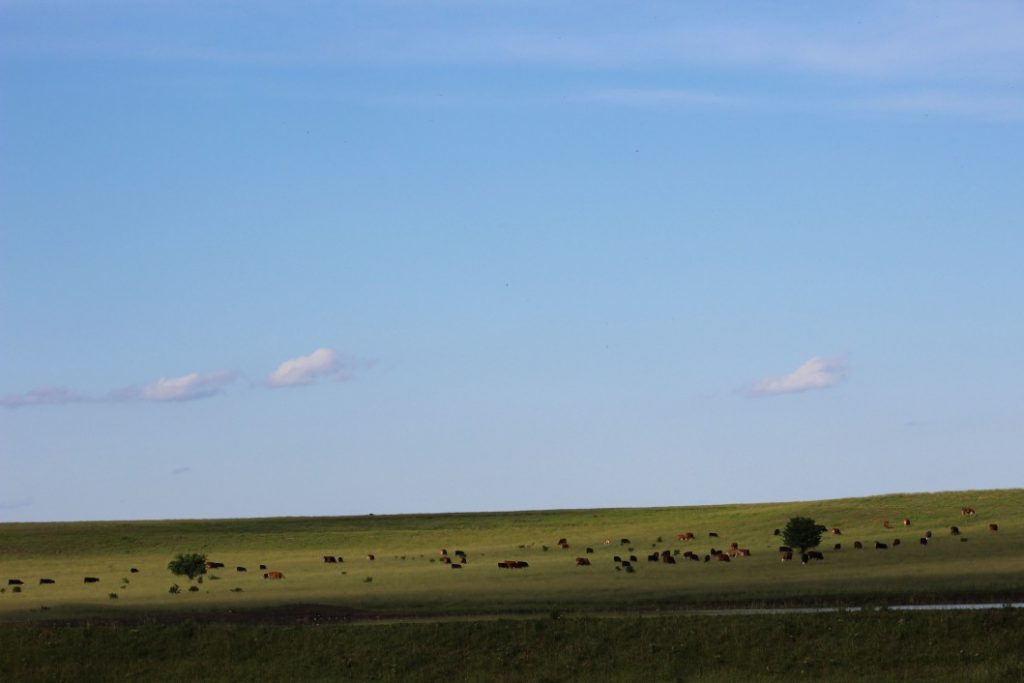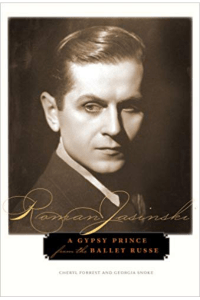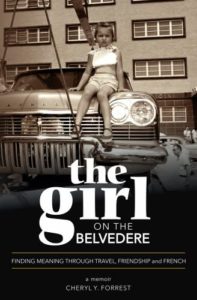
They sat behind me on the small jet, and were bona fide farmers: identically dressed in blue-and-white-striped overalls and work boots, perhaps father and son, conversing in the heavy twang of rural Oklahoma. They were speaking non-stop. Great, I thought, I’m stuck listening to these guys for the next two hours.
I was 20 years old, a college co-ed, as they called us back then. I was a classically trained ballet dancer, a sorority girl, a dance team member. I wore the latest fashions as they existed on conservative campuses during the Vietnam War: short plaid skirts, knee socks, blouses, sweaters. I thought I was all that, and more.
I had boarded the plane during the extended Christmas holiday, Chicago-bound to see a college friend. As we took off, they were speaking of farmer things: crop prices, livestock, weather. As we ascended, however, their focus shifted to what they were observing below: grasslands, rivers, streams, land formations.
“Do you see that little undulation beyond that hill? I bet there’s oil underneath.” “I think you’re right, but they’d sure have to be careful not to disturb what else is going on down there.”
“That land beyond the river looks perfect for a ranch. How many head do you think they could run over there?” “I don’t know, but you’re right, it looks promising.”
“Look at that oxbow lake. I wonder which flood caused that river to change course.” “I’m not sure, but the land running up to it sure looks rich. I wonder what they could grow that wouldn’t ruin it.”
And so it went, for an hour and a half. I listened, transfixed. Gone were any notions of my superiority. These two were educated in ways I had never even considered.
Not once did they discuss television, sports, politics, or anything else that now makes up a normal conversation. They were totally focused on the land, its production, and its protection. “Ecosystem” was a word of the future, but a present reality for them in their Oklahoma twang and slang.
I sat very still in my seat, my head turned, trying nonchalantly to eavesdrop. They were undoubtedly two of the most intellectually curious people I had ever listened to. In the parlance of the time, it blew my mind. I had thought that I was the smart kid, destined for GREAT THINGS. I was suddenly unsure. Would my expensive private college education afford me the same sense of knowledge, the same sureness of my place in the world, the same consideration of my contribution to the betterment of mankind?
The plane eventually landed, and they fell silent as they prepared to deplane. I never did learn why they had traveled to Chicago, but I remember these farmers still, forty years later. I learned that day to consider what had always been placed magically before me in my insulated world: the meals, the heated house, the clothes. Just where did I imagine the beef for my family’s Saturday night hamburgers had come from? The wool for my cute little skirts? The pecans for my favorite Thanksgiving pie? The gasoline for our car, the natural gas for our home? Not to mention the peanuts, the wheat, the corn, and the cotton. I learned to pay attention that day to the ranchers, the oilmen, and the cowboys; to the breeders and the roustabouts. I learned to notice the dairymen, the land men, and the fish farmers, and to respect the wranglers, the linemen, the herders and hands. I learned to appreciate those who made my life so much easier, those individuals who even now feed, clothe, and fuel the world — all because of two farmers on a long-ago plane.
Follow my travels on Instagram @cherylforrestauthor




I would love to read your comments! Please feel free to leave a short note.